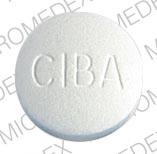Guanethidine Dosage
Applies to the following strengths: 10 mg; 25 mg
Usual Adult Dose for:
Additional dosage information:
Usual Adult Dose for Hypertension
Initial dose: 10 mg orally once a day (25 mg to 50 mg if hospitalized).
Maintenance dose: 25 mg to 50 mg orally once a day.
Usual Adult Dose for Hypertensive Emergency
Loading dose: 25 mg to 50 mg orally 3 times a day at 6 hour intervals over 1 to 3 days. The nighttime dose is omitted.
Renal Dose Adjustments
CrCl < 10 mL/min: The dosing interval should be increased to 24 to 36 hours.
Liver Dose Adjustments
Data not available
Dose Adjustments
Guanethidine has a long duration of action; therefore, dosage increases should not be made more often than every 5 to 7 days. Dosage increases usually start in 10 mg increments and can increase to 25 mg increments, if needed. Hospitalized patients can have dosage increases of 25 mg to 50 mg daily or every other day.
Precautions
Guanethidine is contraindicated in patients with known or suspected pheochromocytoma, frank congestive heart failure not due to hypertension, and in patients who are also taking a monoamine oxidase inhibitor (MAOI).
Dosage requirements for guanethidine may be reduced in the presence of fever.
Special care should be used when treating patients with a history of bronchial asthma; asthmatic patients are more apt to be hypersensitive to catecholamine depletion, and their condition may be aggravated.
The effects of guanethidine therapy are cumulative over long periods; initial doses should be small and increased gradually in small increments.
Guanethidine therapy should be used very cautiously in hypertensive patients with: renal disease and nitrogen retention or rising BUN levels, since decreased blood pressure may further compromise renal function; coronary insufficiency or recent myocardial infarction; and cerebrovascular disease, especially with encephalopathy.
Guanethidine therapy should not be given to patients with severe cardiac failure except with extreme caution, since guanethidine may interfere with the compensatory role of the adrenergic system in producing circulatory adjustment in patients with congestive heart failure.
Patients with incipient cardiac decompensation should be watched for weight gain or edema, which may be averted by the concomitant administration of a thiazide.
Guanethidine therapy should be used cautiously in patients with a history of peptic ulcer or other chronic disorders that may be aggravated by a relative increase in parasympathetic tone.
Safety and effectiveness in pediatric patients have not been established.
Dialysis
Data not available
Other Comments
Blood pressure should be measured in the supine position, after standing for 10 minutes, and immediately after exercise if feasible. Dosage may be increased only if there has been no decrease in the standing blood pressure from previous levels.
More about guanethidine
- Check interactions
- Compare alternatives
- Side effects
- During pregnancy
- Drug class: antiadrenergic agents, peripherally acting
Patient resources
Other brands
Related treatment guides
See also:
Further information
Always consult your healthcare provider to ensure the information displayed on this page applies to your personal circumstances.


